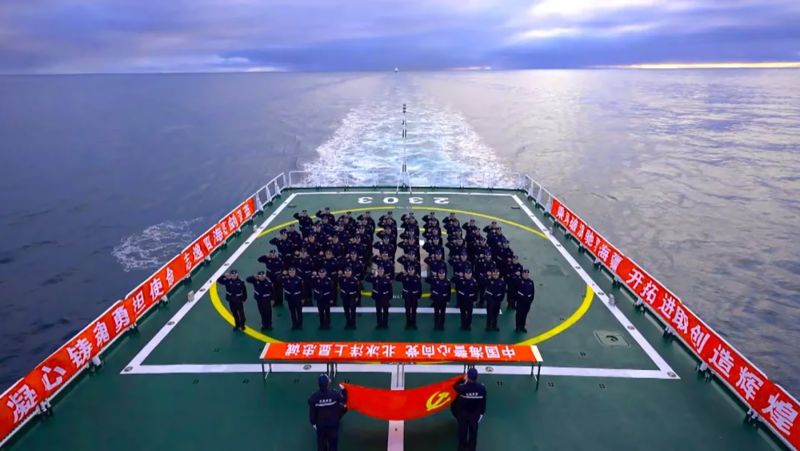China’s Coast Guard, in a remarkable first, purports to have traversed the icy expanses of the Arctic Ocean, bolstering its strategic and security liaisons with Russia. This purported expedition underscores the intensifying militarization of the High North and exemplifies China’s growing global reach and interest in this resource-rich and strategically important area.
China’s Coast Guard’s movement into the unchartered territory of the Arctic seems to signal a watershed moment in the wider geopolitical scenario. However, the details regarding the time, duration, and exact route of the journey remain uncertain and kept under wraps by the Chinese authorities. This lack of concrete information has led to speculation and has raised several eyebrows within the international community, signifying a potential shift in regional power dynamics.
The joint operation with Russia indicates the strengthening relations between the two countries, particularly within the purview of maritime security. Russia has been a dominant player in the Arctic region, thanks to its geographical advantage. Its cooperation with China’s Coast Guard not only cements the relationship between these two global powers but also illustrates their shared interests in the Arctic region and mutual respect for each other’s sovereignty.
The venture into the Arctic Ocean reflects China’s strategic ambitions. China, in its Arctic Policy white paper, declared itself as a “near-Arctic state,” and expressed its interest in playing a more significant role in the Arctic region, citing the potential economic benefits derived from the valuable resources and the potential shipping routes passing through this region.
The joint patrol with Russia can be seen as a counter-measure or response to the increasing presence and activities of Western powers in the Arctic. With Western countries, particularly the US, making strategic inroads in the Arctic, China and Russia seem to be making a statement of solidarity against Western influence.
The implications of the Chinese Coast Guard’s presence in the Arctic Ocean can be profound. From one perspective, it underlines China’s attempts to extend its influence and further consolidate its position among the polar nations and beyond. From another viewpoint, it underscores the growing assertiveness of Russia and China in challenging the conventional power structures in the Arctic and globally.
The impact of climate change on the Arctic region provides another critical dimension to this development. As the Arctic ice continues to melt at an unprecedented rate, the region’s rich deposits of oil, natural gas, and rare minerals are becoming more accessible. These resources, combined with new potential shipping routes, can play a huge role in shaping economic and strategic interests in the future. China, cognizant of this changing landscape, may be positioning itself to take advantage of these emerging opportunities.
Furthermore, the presence of China’s Coast Guard in the Arctic Ocean might be indicative of China’s vision to incorporate the Arctic into its ambitious Belt and Road Initiative. The so-called ‘Polar Silk Road’ could provide an essential shortcut between Asia and Europe, significantly reducing the shipping times and the associated costs.
In conclusion, while it may be a first, it is unlikely that China Coast Guard’s venture into the Arctic will be its last. This move underscores China’s growing global ambitions and her intent to substantiate her footprint in global geopolitics. This development also points towards an emerging multi-polar world where more players are drawn towards the Arctic, marking a new era in the geopolitics of this traditionally less trod region.




